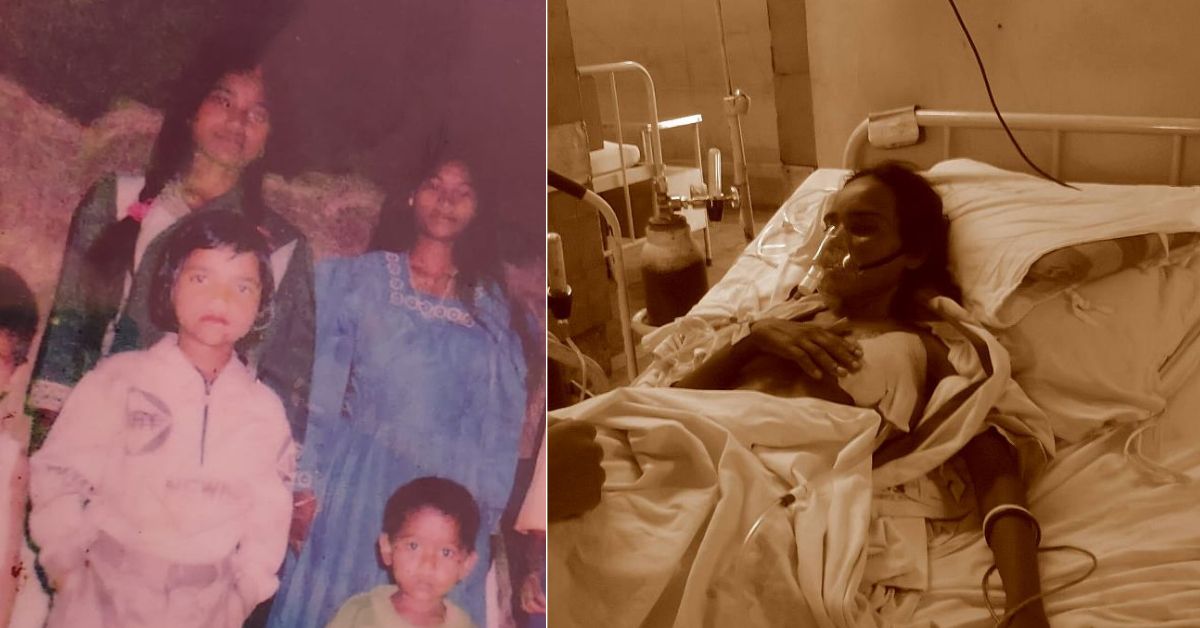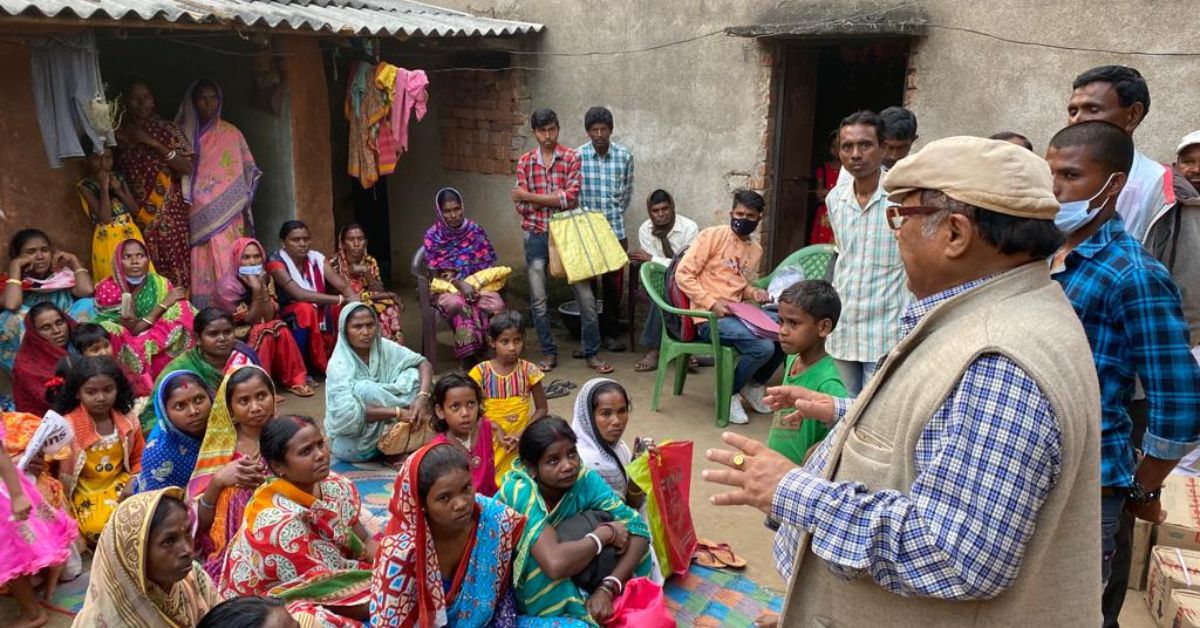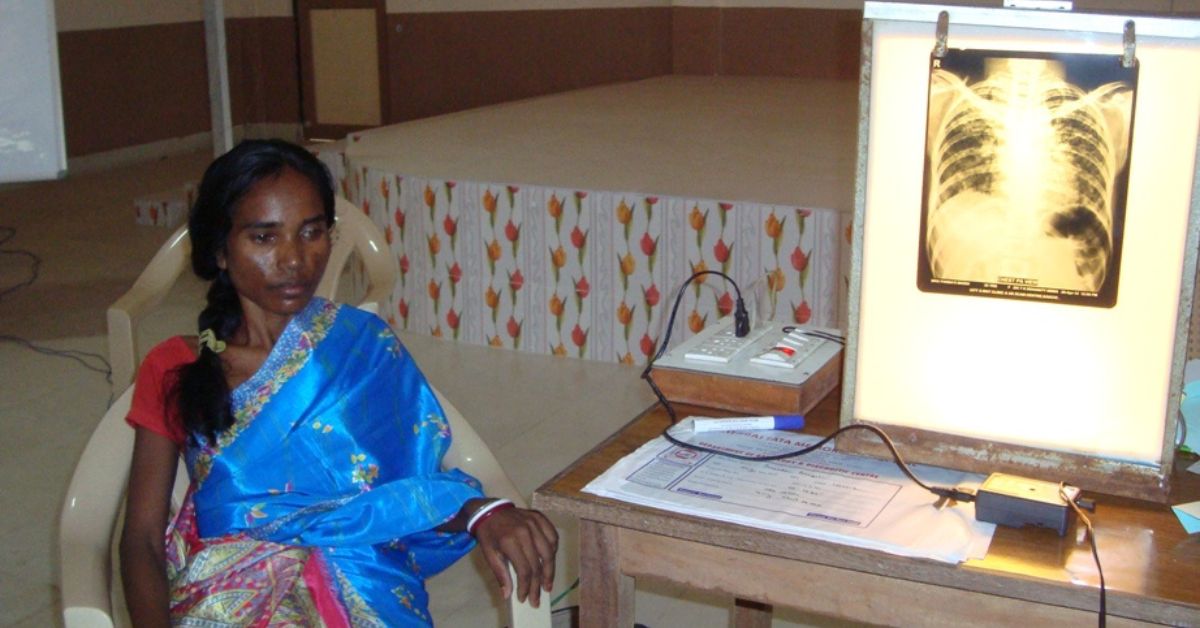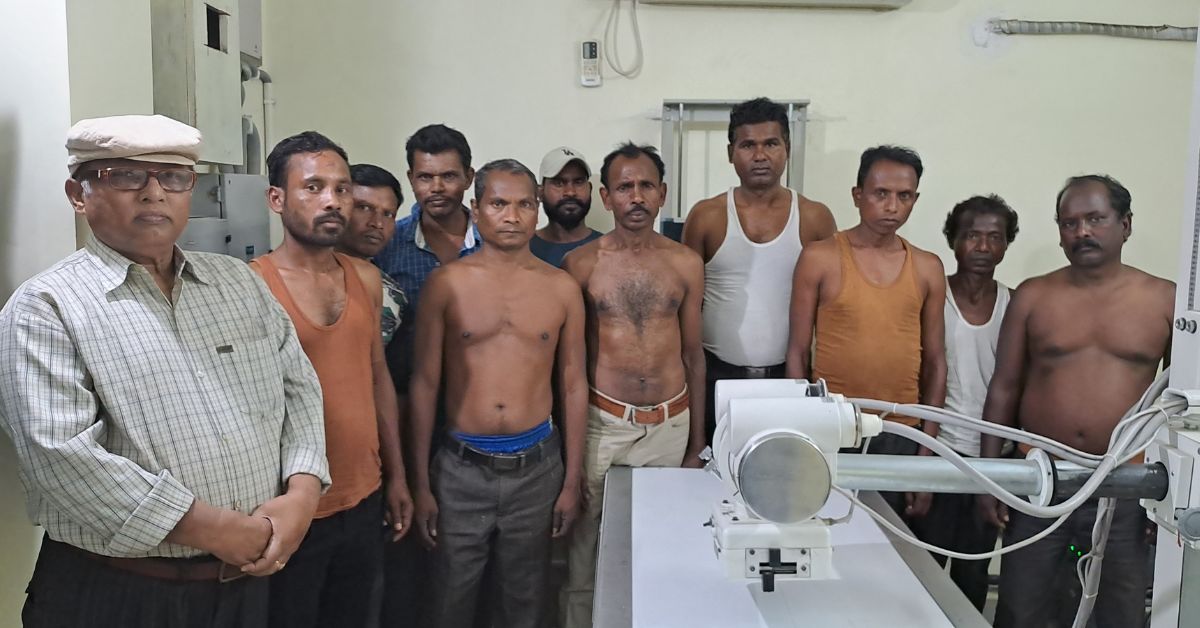Trigger warning: Mention of death.
Every morning, Jharkhand’s Parvati Mardi would comb her hair, wear a bindi, and set out to work in a clean saree. But by the evening, she would be beyond recognisable.
“She worked in a ramming mass industry. As part of this, she would be exposed to silica dust all day. I remember that whenever she would come home in the evening, she would be completely covered in dust — her hair, clothes, all her body. It would get a little difficult for us to recognise her. The first thing ma would do was to take a bath before touching us,” her daughter Laxmi Mardi tells The Better India.
In the tribal belts of Jharkhand, a large number of workers are forced to work in the ramming mass factories where quartzite stones are ground and powdered into dust and different-sized particles to prepare ‘ramming mass’. This is used to produce refractory items like fire bricks for steel industries and to manufacture insulators with silica sand. When huge quartzite stones are broken and milled, dust is released. This dust contains silicon dioxide which when inhaled over some time leads to silicosis disease.
“We started noticing that our mother would cough a lot and often complained about facing difficulty in breathing. Day by day, she also started losing weight,” she informs.
This continued for four years until one day she was diagnosed with silicosis in April 2012. “This was the first time we heard about the disease. We took her to the hospital, but we were too young to understand the severity of the disease and how long she was going to stay with us. I was 14 years old then, and I was told that she would be home soon,” she recalls.

Sadly, Laxmi’s mother could not be saved. “She was just 33. All this pain was for Rs 80-100 wage per day. If I had known about the consequences, I would have never let my mother go to that place,” Laxmi, now 28, says with a sigh.
Parvati was survived by her husband, her daughter Laxmi, and two younger sons. That day, Laxmi pledged to escape the life of drudgery — far from the ramming mass industry due to which at least 10,000 silicosis patients lost their lives in the past two decades.
Today, Laxmi works as a nursing officer and bears all the household responsibilities along with the college fees of her younger brothers.
“This became possible with the support of Samit Carr sir. Firstly, his organisation bore our mother’s treatment cost of Rs 3.6 lakh. Then, he encouraged me to pursue a career in nursing by getting a BSc degree. He also fought to get us a compensation amount of Rs 4 lakh from the Government,” she adds.
Like Laxmi, the Jharkhand-based non-profit, Occupational Safety And Health Association of Jharkhand (OSHAJ), led by Samit Kumar Carr, has helped at least 50 kin of the workers who died of silicosis get compensation amount of Rs 4 lakh each.
Besides, he has also helped the kin of 22 workers who died of silicosis in West Bengal get a compensation amount of Rs 4 lakh each, and 30 silicosis-affected workers with a compensation of Rs 2 lakh each. In addition, Rs 10 crore funds were sanctioned for pension and welfare schemes.
For the past two decades, he has been actively fighting for the rights of silicosis patients in Jharkhand and West Bengal. We sat down with the 68-year-old activist to learn how he is fighting authorities to help families cope with financial distress caused by the incurable disease.

Silicosis: a silent killer
Originally from Tripura, Samit’s family moved to Jamshedpur in 1955. While completing a draftsmanship course at Singhbhum Institute of Technology, he remained unaware of the brutality experienced by workers exposed to silica dust.
It was in 2002 that he first read about the rising deaths of silicosis patients in the East Singhbhum district.
“In 2003, I closely observed some silicosis patients. Most of them had difficulty in breathing, and could not sleep easily because of it. One of the patient’s daughters told us that she visited the site daily to give lunch to her father, but she always found it difficult to recognise him as everyone would be covered in silica dust,” he tells The Better India.
Silicosis is an incurable lung disease caused by the inhalation of dust containing silica crystals found commonly in quartzite, granite, basalt, sandstone, agate, slate marble, and building materials like fire bricks and tiles. This exposes workers in dust-generating sites like factories, mining and construction sites to a high risk of contracting the disease, which leads to prolonged illness and painful death.

“The percentage of silicon dioxide in stones, the concentration of dust at the workplace, long working hours, dust exposed to them post duty hours, as well as poor immunity of workers, collectively makes them vulnerable to silicosis,” informs Samit.
He continued to closely watch the working conditions of these workers at the ramming mass industries. “I went there to record a video of a woman worker who was covered in silica dust. She said that her husband was diagnosed with silicosis and the family exhausted all their money in treatment. But, he could not be saved,” he shares.
“But she refused to be recorded. She complained that, like me, many people visit them, click photos, and never come back. I was embarrassed. But that day, I promised myself that I would strive to get justice for these people,” he adds.
Since then, Samit has been on a mission to ensure that the families of workers who died due to silicosis are compensated by the Government. In 2003, he established OSHAJ to advocate for the rights of such workers.
‘Didn’t stop even when I was accused of witchcraft’
Often, Samit travels from village to village in the tribal areas of Jharkhand and West Bengal to document the occupational and clinical histories of the workers and to collect chest X-ray plates from the workers for medical tests. After identifying patients, he encourages them to find alternate employment and helps their families get monetary compensation from the Government in case the patient is deceased.
But this process isn’t easy. “Initially, whenever I would voice for the rights of these workers, I would be thrown out of meetings. People started avoiding me and accusing me of practising witch-hunting. But eventually, they shared their documents with me, and I started fighting for the silicosis-affected community in 2006,” he adds.

“Also, there has been immense politics right from the hospital level to the state officials. Many times, doctors also refuse to write correct reports because of pressure from higher authorities. We keep making rounds of the officials at the district levels to get these families their compensation rights,” he adds.
After knocking on several official doors, Samit reached out to the National Human Rights Commission (NHRC) and filed a petition on 8 October, 2007, to seek their support for the relief of silicosis patients and their families. “While there is no formal amount of allocation, it directs the Government to provide Rs 4 lakh compensation to the kin of dead workers,” he adds.
In the past 20 years, Samit says, his organisation was able to source compensation amounts worth Rs 13.52 crore for workers in Jharkhand and West Bengal. “We also were able to raise Rs 88 lakh from donors in 10 years in both states for the treatment of silicosis patients,” he says.
Samit says that the monetary support from the Government is extremely important for these families. “When the breadwinners of the families die, young orphan children are forced to migrate for earning opportunities and lose their right to education. For them, the monetary compensation is a ray of hope for a better future. Many families have used these amounts to set up small businesses,” he says.
“I don’t have any children but whenever I see young kids of dead workers, it aches my heart. Thankfully, with our small efforts, we can protect the future generations of some such workers. Now as I am getting old, I want to pass on my experience to dedicated people so that this work does not stop even after me. Otherwise, we will have to shut down the organisation by 2025. We also require decent funding support to continue this work,” shares Samit.
To support him in his mission, you can reach out to Samit Kumar Carr at roshniforlabour@gmail.com
Source:
Breathless: Silicosis is killing workers in Jharkhand: By Vikram Raj for The Hindu published on 4 March 2022.
Edited by Pranita Bhat. All photos: Samit Kumar Carr.
No comments:
Post a Comment